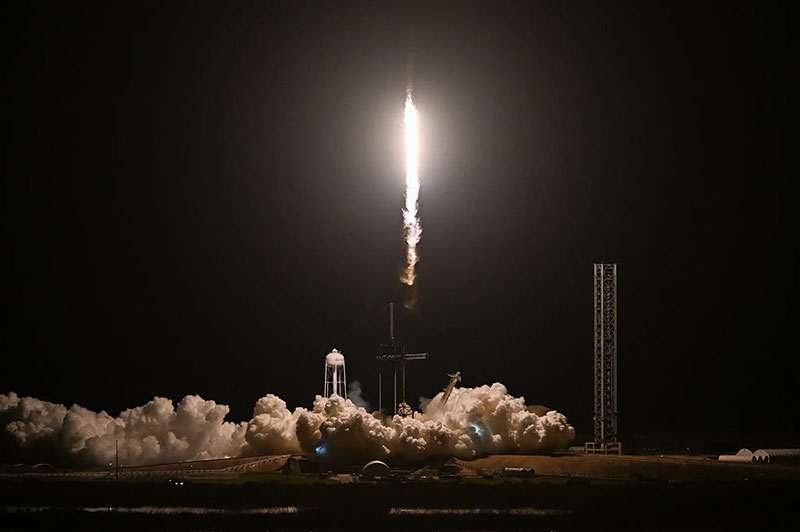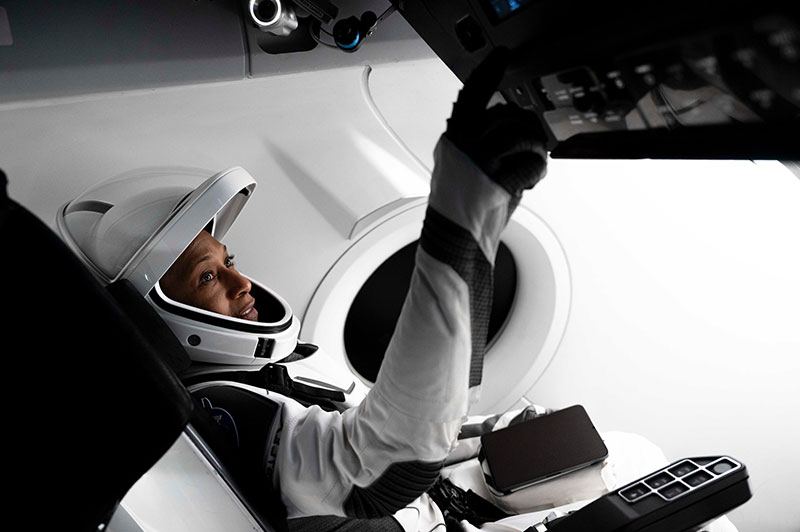
|
 |
Jeanette Epps. M.S. '94, Ph.D '00 (below, pictured in crew capsule) is part of a NASA-Space X crew of three American astronauts and one Russian cosmonaut that lifted off late Sunday night from Kennedy Space Center for a six-month mission on the International Space Station. Photo by CHANDAN KHANNA/AFP via Getty Images. |
|
By Annie Krakower for Maryland Today
As the countdown reached zero and the Falcon 9 rocket lifted off amid billowing smoke and flame from the John F. Kennedy Space Center on Sunday night, a Terp was preparing to take up temporary residence in a new home circling over the globe.
Mission specialist Jeanette Epps M.S. ’94, Ph.D. ’00, one of four astronauts on NASA’s SpaceX Crew-8 mission, is beginning a six-month stint on the International Space Station (ISS), where she’ll serve as a flight engineer. A NASA astronaut since 2009, she ventured into space for the first time.
“I’ve learned a lot about myself over these years training for spaceflight,” she said in a January interview. “I’ve learned a lot about my limitations, how far I can go, what excites me, what I’m afraid of, how I overcome those things and move forward. It is a great journey of self-exploration as well.”
The adventure started in elementary school, when Epps’ older brother suggested that her stellar math and science grades could launch her to a space-focused career. After receiving her bachelor’s in physics from LeMoyne College, she earned master’s and doctoral degrees in aerospace engineering at the University of Maryland, where she built models, tested rotor blades and developed code.
After stops working in Ford Motor Company’s Scientific Research Lab and then as a technical intelligence officer for the CIA, she used that experience to help pass a rigorous selection process at NASA.
“All this hands-on work that I was able to do at the University of Maryland translates directly to what we do as astronauts,” Epps said. “(It’s) having that understanding of tools, how to use the tools, how to use them properly and effectively, and then understanding, ‘Well, this isn’t going to work, but I know a tool that will work.’”
She was reassigned from flights on a Soyuz spacecraft and aboard a Boeing Starliner. But Epps continued vigorous training: She lived in a cave for five days and in an underwater habitat for nine, mastered Russian and learned to fly a T-38 jet.
 Now, as she takes in the long-awaited view of the Earth from 250 miles above the surface, she’ll maintain equipment and systems while working with crewmates Matthew Dominick, Michael Barratt and Alexander Grebenkin to conduct around 200 experiments to advance space exploration and benefit life on Earth. Now, as she takes in the long-awaited view of the Earth from 250 miles above the surface, she’ll maintain equipment and systems while working with crewmates Matthew Dominick, Michael Barratt and Alexander Grebenkin to conduct around 200 experiments to advance space exploration and benefit life on Earth.
“We accept that responsibility with humility and respect,” pilot Barratt said in a pre-launch news conference. “We will carry a lot of our community with us.”
For Epps, the sense of responsibility is intensified as she becomes just the second Black woman to join the ISS. She hopes her work can inspire the next generation of scientists and researchers.
“We’re developing new technologies. We’re creating jobs, we’re creating interest in science, we’re creating more interest in STEM,” she said. “All the social issues that we have on Earth seem to be dwarfed by the magnitude of the things that we’re trying to accomplish.”
Robert Herschbach contributed to this story.
Related Articles:
Agents of Positive Change: Highlighting Women Maryland Engineers
Women’s History Month Spotlight
Celebrating Women's History Month
Ask An Engineer: Space Travel
UMD Alumna Receives PECASE Award, Highest Honor Given by U.S. Government to Early Career Scientists
How Will You Impact Society?
March 4, 2024
|